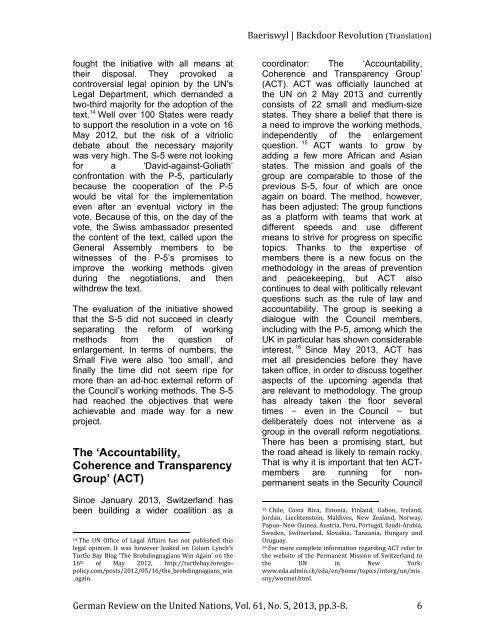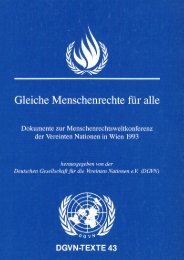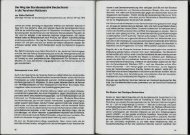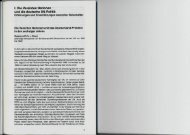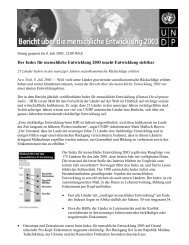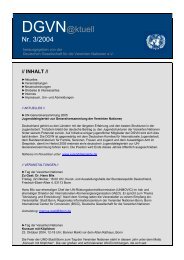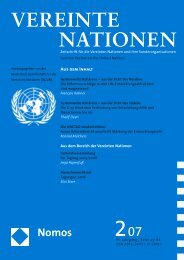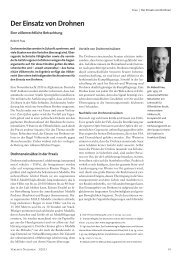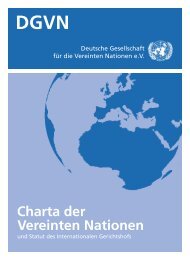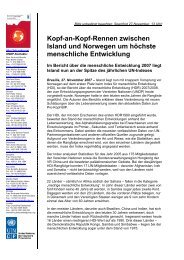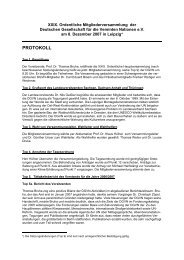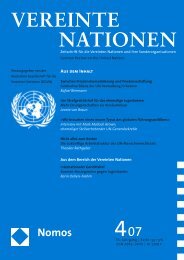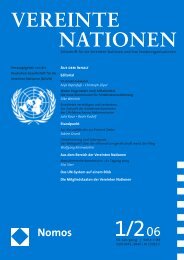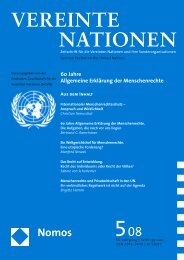Backdoor Revolution. Modern Working Methods for a more efficient ...
Backdoor Revolution. Modern Working Methods for a more efficient ...
Backdoor Revolution. Modern Working Methods for a more efficient ...
Create successful ePaper yourself
Turn your PDF publications into a flip-book with our unique Google optimized e-Paper software.
Baeriswyl | <strong>Backdoor</strong> <strong>Revolution</strong> (Translation) <br />
fought the initiative with all means at<br />
their disposal. They provoked a<br />
controversial legal opinion by the UN’s<br />
Legal Department, which demanded a<br />
two-third majority <strong>for</strong> the adoption of the<br />
text. 14 Well over 100 States were ready<br />
to support the resolution in a vote on 16<br />
May 2012, but the risk of a vitriolic<br />
debate about the necessary majority<br />
was very high. The S-5 were not looking<br />
<strong>for</strong> a ‘David-against-Goliath’<br />
confrontation with the P-5, particularly<br />
because the cooperation of the P-5<br />
would be vital <strong>for</strong> the implementation<br />
even after an eventual victory in the<br />
vote. Because of this, on the day of the<br />
vote, the Swiss ambassador presented<br />
the content of the text, called upon the<br />
General Assembly members to be<br />
witnesses of the P-5’s promises to<br />
improve the working methods given<br />
during the negotiations, and then<br />
withdrew the text.<br />
The evaluation of the initiative showed<br />
that the S-5 did not succeed in clearly<br />
separating the re<strong>for</strong>m of working<br />
methods from the question of<br />
enlargement. In terms of numbers, the<br />
Small Five were also ‘too small’, and<br />
finally the time did not seem ripe <strong>for</strong><br />
<strong>more</strong> than an ad-hoc external re<strong>for</strong>m of<br />
the Council’s working methods. The S-5<br />
had reached the objectives that were<br />
achievable and made way <strong>for</strong> a new<br />
project.<br />
The ‘Accountability,<br />
Coherence and Transparency<br />
Group’ (ACT)<br />
Since January 2013, Switzerland has<br />
been building a wider coalition as a<br />
14 The UN Office of Legal Affairs has not published this <br />
legal opinion. It was however leaked on Colum Lynch’s <br />
Turtle Bay Blog ‘The Brobdingnagians Win Again’ on the <br />
16 th of May 2012, http://turtlebay.<strong>for</strong>eign-policy.com/posts/2012/05/16/the_brobdingnagians_win<br />
_again. <br />
coordinator: The ‘Accountability,<br />
Coherence and Transparency Group’<br />
(ACT). ACT was officially launched at<br />
the UN on 2 May 2013 and currently<br />
consists of 22 small and medium-size<br />
states. They share a belief that there is<br />
a need to improve the working methods,<br />
independently of the enlargement<br />
question. 15 ACT wants to grow by<br />
adding a few <strong>more</strong> African and Asian<br />
states. The mission and goals of the<br />
group are comparable to those of the<br />
previous S-5, four of which are once<br />
again on board. The method, however,<br />
has been adjusted: The group functions<br />
as a plat<strong>for</strong>m with teams that work at<br />
different speeds and use different<br />
means to strive <strong>for</strong> progress on specific<br />
topics. Thanks to the expertise of<br />
members there is a new focus on the<br />
methodology in the areas of prevention<br />
and peacekeeping, but ACT also<br />
continues to deal with politically relevant<br />
questions such as the rule of law and<br />
accountability. The group is seeking a<br />
dialogue with the Council members,<br />
including with the P-5, among which the<br />
UK in particular has shown considerable<br />
interest. 16 Since May 2013, ACT has<br />
met all presidencies be<strong>for</strong>e they have<br />
taken office, in order to discuss together<br />
aspects of the upcoming agenda that<br />
are relevant to methodology. The group<br />
has already taken the floor several<br />
times ̶ even in the Council ̶ but<br />
deliberately does not intervene as a<br />
group in the overall re<strong>for</strong>m negotiations.<br />
There has been a promising start, but<br />
the road ahead is likely to remain rocky.<br />
That is why it is important that ten ACTmembers<br />
are running <strong>for</strong> nonpermanent<br />
seats in the Security Council<br />
15 Chile, Costa Rica, Estonia, Finland, Gabon, Ireland, <br />
Jordan, Liechtenstein, Maldives, New Zealand, Norway, <br />
Papua-‐ New Guinea, Austria, Peru, Portugal, Saudi-‐Arabia, <br />
Sweden, Switzerland, Slovakia, Tanzania, Hungary and <br />
Uruguay. <br />
16 For <strong>more</strong> complete in<strong>for</strong>mation regarding ACT refer to <br />
the website of the Permanent Mission of Switzerland to <br />
the UN in New York: <br />
www.eda.admin.ch/eda/en/home/topics/intorg/un/mis<br />
sny/wormet.html. <br />
German Review on the United Nations, Vol. 61, No. 5, 2013, pp.3-‐8. <br />
6


